

Coronavirus: Can a pandemic remake society? A big question about the coronavirus pandemic is how much change it will leave in its wake.
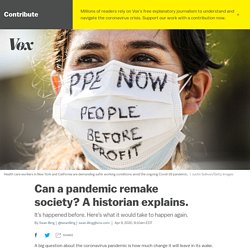
Are we in the midst of a massive, potentially revolutionary transformation of society? Or are we experiencing an intense shock that will change our society in the short term but leave it fundamentally intact? Economic historian Walter Scheidel explored the former category — revolutionary transformations — in his influential 2017 book, The Great Leveler: Violence and the History of Inequality from the Stone Age to the Twenty-First Century.
In that book, Scheidel identifies four classes of events — lethal pandemics, major wars, state failures, and revolutions — that reshape societies by flattening economic inequalities. Each of these events, in their own way, levels the playing field and paves the way for a new order. He argued that it’s possible — but how far-reaching the transformation is depends on what happens in the coming months. Témoignages de Wuhan, loin de l’image diffusée par les médias chinois. Le Dr Li, qui est cardiologue à l’hôpital N° 4 de Wuhan, a passé la troisième semaine de mars à préparer la réouverture des cliniques générales de l’hôpital, qui ont fermé le 22 janvier, lorsque l’hôpital N° 4 est devenu un établissement clé pour le traitement des patients du Covid-19.

Après avoir travaillé durant deux mois en première ligne de l’épidémie, Li est mentalement et psychologiquement perdu quant à la suite des événements. Il n’arrive ni à dormir ni à manger, se sent souvent hébété et parfois, sans savoir pourquoi, il se met à pleurer. Le traumatisme de Li contraste fortement avec l’image diffusée par les médias chinois, qui regorgent d’articles et d’émissions glorifiant la réponse du gouvernement à l’épidémie.
Au milieu d’une telle exultation, Li est de plus en plus réticent à exprimer ses craintes ou ses préoccupations à ceux qui l’entourent. Italy, Pandemic’s New Epicenter, Has Lessons for the World. “We have been the first ones with the most rigorous and accurate controls,” he said on television, adding that more people in Italy appeared infected because “we did more tests.”
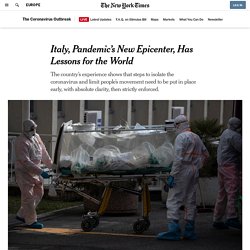
The next day, as infections surpassed 200, seven people died and the stock market plunged, Mr. Conte and his health aides doubled down. He blamed the Codogno hospital for the spread, saying it had handled things in “a not-completely-proper way” and argued that Lombardy and Veneto, another northern region, were inflating the severity of the problem by diverging from global guidelines and testing people without symptoms. As Lombardy officials scrambled to free up hospital beds, and the number of infected people rose to 309 with 11 dead, Mr. Conte said on Feb. 25 that “Italy is a safe country and probably safer than many others.” How the Virus Got Out. Coping with Fatigue, Fear, and Panic During a Crisis. Executive Summary Fatigue, fear, and panic undermine our ability to think clearly and creatively, manage our relationships effectively, focus attention on the right priorities, and make smart, informed choices.
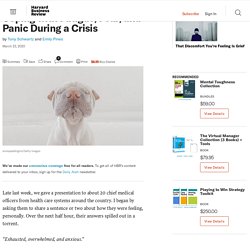
So when faced with a serious crisis, how can we take better care of ourselves and build more resilience? One way is to become more aware of the three selves that influence our behavior in the face of threat and danger. The overwhelmed self is the most defenseless, vulnerable, and childlike part of us. The adult self is capable and can soothe and reassure our overwhelmed self.
We’ve made our coronavirus coverage free for all readers. Late last week, we gave a presentation to about 20 chief medical officers from health care systems around the country. Substantial undocumented infection facilitates the rapid dissemination of novel coronavirus (SARS-CoV2) Abstract Estimation of the prevalence and contagiousness of undocumented novel coronavirus (SARS-CoV2) infections is critical for understanding the overall prevalence and pandemic potential of this disease.
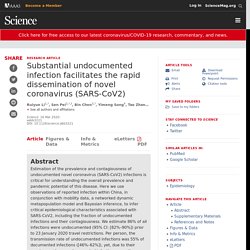
Here we use observations of reported infection within China, in conjunction with mobility data, a networked dynamic metapopulation model and Bayesian inference, to infer critical epidemiological characteristics associated with SARS-CoV2, including the fraction of undocumented infections and their contagiousness. We estimate 86% of all infections were undocumented (95% CI: [82%–90%]) prior to 23 January 2020 travel restrictions. Per person, the transmission rate of undocumented infections was 55% of documented infections ([46%–62%]), yet, due to their greater numbers, undocumented infections were the infection source for 79% of documented cases. These findings explain the rapid geographic spread of SARS-CoV2 and indicate containment of this virus will be particularly challenging. Coronavirus: pourquoi il ne faut pas espérer un retour à la normale dans les prochains mois. Les prédictions mathématiques.
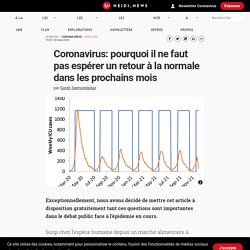
Ce sont les prédictions des épidémiologistes qui soulignent la difficulté d’un rapide retour à la normale. Coronavirus among health workers: Exposure, lack of testing, threatens health system. Homepage - GHS Index. The COVID-19 Vaccines Are Not What You Think. The process is simple.

Surrender some of your blood, and a lab will filter out the cells and keep only the amber-colored serum, with the antibodies to the virus still in there and active. This serum, further refined, is called “hyperimmune globulin.” All that remains is to infuse the serum into a healthy person (or, in much greater quantities, into a sick one). The antibodies won’t last forever, but they could last weeks or months, and either help a sick recipient heal or keep a healthy recipient from getting the virus at all. Yesterday, a team at Johns Hopkins University led by Arturo Casadevall received FDA approval to try this technique. The approach does carry risks. How Will the Coronavirus End? Editor’s Note:The Atlantic is making vital coverage of the coronavirus available to all readers.
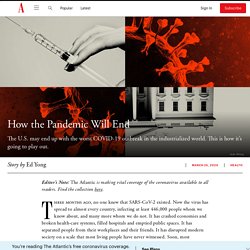
Find the collection here. Three months ago, no one knew that SARS-CoV-2 existed. Now the virus has spread to almost every country, infecting at least 446,000 people whom we know about, and many more whom we do not. It has crashed economies and broken health-care systems, filled hospitals and emptied public spaces. It has separated people from their workplaces and their friends. Italy, Pandemic’s New Epicenter, Has Lessons for the World. Italy, Pandemic’s New Epicenter, Has Lessons for the World. (1) «Véran est médecin, il est censé être notre capitaine» Au cabinet médical, le quotidien change.
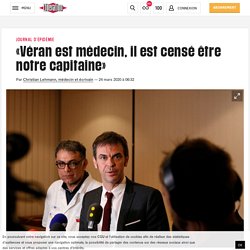
Et maintenant on culpabilise les citoyens. « Une des stratégies les plus efficaces mises en œuvre dans toute situation d’urgence par les pouvoirs forts consiste à culpabiliser les individus pour obtenir d’eux qu’ils intériorisent la narration dominante sur les événements en cours, afin d’éviter toute forme de rébellion envers l’ordre constitué. » Une tribune venue d’Italie qui s’applique à ce qui se joue aujourd’hui en France.
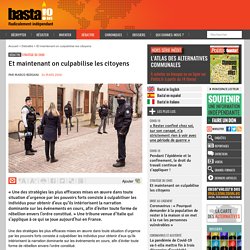
Petit Guide pratique du Confiné sans audio.pdf. Verbalisé (parce que) Préambule : J’inclus dans cet inventaire des PV arbitraires ou abusifs, moralement ou légalement. Au delà de la subjectivité dans l’appréciation, ce n’est qu’une collection de liens publics, qui ne se veut même pas exhaustive. Je me contente d’éviter ce qui me parait contestable ou litigieux. Coronavirus: The Hammer and the Dance - Tomas Pueyo - Medium. As of today, there are 0 daily new cases of coronavirus in the entire 60 million-big region of Hubei. The diagnostics would keep going up for a couple of weeks, but then they would start going down. With fewer cases, the fatality rate starts dropping too. And the collateral damage is also reduced: fewer people would die from non-coronavirus-related causes because the healthcare system is simply overwhelmed.
Suppression would get us: Fewer total cases of CoronavirusImmediate relief for the healthcare system and the humans who run itReduction in fatality rateReduction in collateral damageAbility for infected, isolated and quarantined healthcare workers to get better and back to work. Understand the True Problem: Testing and Tracing. How the Virus Got Out. Comment la Chine a laissé échapper le coronavirus. Covid-19: histoire d’une médiatisation – Le Temps. «On va tous craquer» : face à l’épidémie de coronavirus, des soignants sous pression témoignent. Coronavirus: Kind Canadians start 'caremongering' trend. Image copyright Getty Images Just a few days ago the word "caremongering" did not exist. Now, what started as a way to help vulnerable people in Toronto has turned into a movement spreading fast across Canada. More than 35 Facebook groups have been set up in 72 hours to serve communities in places including Ottawa, Halifax and Annapolis County in Nova Scotia, with more than 30,000 members between them.
People are joining the groups to offer help to others within their communities, particularly those who are more at risk of health complications related to coronavirus. The pandemic has led to acts of kindness around the world, from delivering soup to the elderly in the UK to an exercise class held for quarantined residents on their balconies in Spain. But in Canada, a country whose inhabitants are stereotyped in the media as kind to a fault, helping others has become an organised movement called "caremongering".
The acts of kindness sparked by coronavirus Image copyright Submitted. How Coronavirus Is Affecting Victims of Domestic Violence. The psychological impact of quarantine and how to reduce it: rapid review of the evidence. Summary The December, 2019 coronavirus disease outbreak has seen many countries ask people who have potentially come into contact with the infection to isolate themselves at home or in a dedicated quarantine facility. Decisions on how to apply quarantine should be based on the best available evidence. We did a Review of the psychological impact of quarantine using three electronic databases. Coronavirus : doit-on s’interdire de faire l’amour ? C'est acté. Vous êtes désormais confiné (e) avec votre moitié au moins quinze jours.
Coronavirus : boom des divorces après les levées de confinement en Chine. (2) La moitié des écoliers et étudiants dans le monde privée d'établissement scolaire.